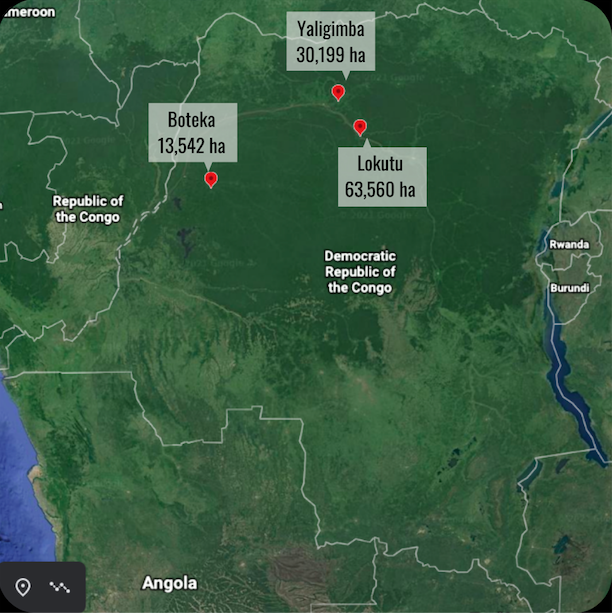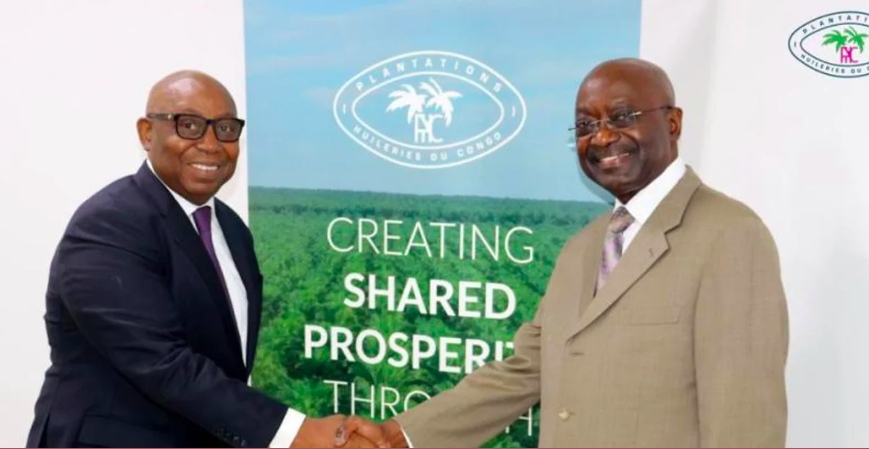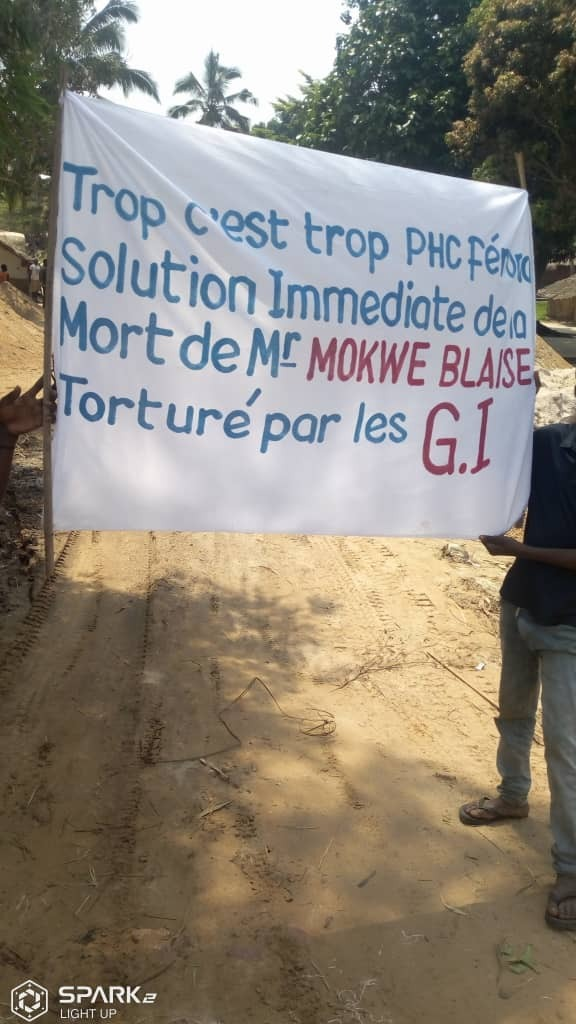

Following the brutal reign of King Leopold II in what was then considered his private property, the Congo became a Belgian colony in 1908. Three years later, the colonial authorities granted British industrialist Lord Leverhulme a license to create large scale oil palm plantations on over 750,000 hectares. In addition to the theft of land from indigenous communities, historical records show that in the following decades, forced labor was used on a massive scale, enforced by the Belgian colonial army on behalf of Leverhulme. With the goal of establishing a monopoly, local communities were prevented from cultivating and trading oil palm despite the fact that they had produced it long before Belgian colonisation. These plantations fuelled the rise of the Lever Brothers and laid the foundation of what is today one of the world’s largest multinational corporations – Unilever.

PHC Holdings in Congo-Kinshasa. The original 1911 concession to Lord Leverhulme amounted to 750,000 ha. (1.8 million acres). The land has never reverted back to the Congolese people. Courtesy: The Oakland Institute.
With their land forcibly stolen to establish the oil palm plantations, the Lokutu, Yaligimba, and Boteka communities in the DRC remain displaced and afflicted with human rights and environmental abuses today. Their livelihoods are severely impacted by the lack of land, a situation that has been worsening over time as the population grows. Hunger and poverty are widespread, and the dumping of untreated industrial waste has polluted major sources of drinking water. Unilever sold the plantations in 2002, and they have changed ownership a few times since.

Founder of New York-based private equity firm, Kuramo Capital Management, Wale Adeosun (left) with Plantation et Huileries COO, Dr Mpoko Bokanga. Since KCM acquired a controlling interest in PHC, partners have been embroiled in a nasty, very public legal battle over the control of Lord Leverhulme’s land holdings in the Congo-Kinshasa. Photo courtesy: The Oakland Institute
Remarkably, the land that became the private property of a Belgian king 140 years ago has still not been returned to its Congolese owners. Instead, it is now controlled by a U.S-based private equity fund, funnelling profits to its high profile investors, including the Bill & Melinda Gates Foundation Trust and endowments of several prestigious universities in the United States.
Community members who work as labourers on the plantations are subjected to unpaid wages and harsh working conditions. Their day-to-day life is plagued by violence and repression prosecuted by plantation security forces and police forces directed by the company, with a myriad of unlawful detentions, beatings, torture, and even murders. Residents in Lokutu rose up in March 2019 when the Congolese police, who had been sent to end the demonstrations, ended up firing live bullets into the crowd.
In addition to this historical colonial exploitation, DRC continues to face new forms of extraction, with even more dire consequences for the Congolese people. For the past three decades, the country has faced bloody conflicts, which have claimed millions of lives, particularly affecting the mineral-rich eastern region of the country.
These wars not only destroy the country economically, they ruin its people, especially the women. The use of rape as a weapon in the DRC has been widely reported and is so prevalent that the country has been labelled the rape capital of the world. The United Nations estimates that more than 200,000 Congolese women are rape survivors. Congolese doctor, Denis Mukwege, the Nobel Prize winner who earned the moniker “the man who heals women”, has spoken about how the global demand for the mineral coltan, like rubber and oil palm during Leopold’s time, is fuelling conflict and consequently, rape in his country. Mukwege has highlighted that the problem is not just the Congolese men and government, but pointed to the responsibility of the international community and the multinational corporations who benefit from Congo’s mineral wealth in ensuring the return of peace.

Community members of Mwingi near the disputed land of the Lokutu oil palm concession © Oskar Epelde.
In his book King Leopold’s Ghost, the historian Adam Hochschild tells how the DRC has had the most difficulty escaping from the colonial powers even today. “From the colonial era, the major legacy Europe left to Africa was not democracy as it is practiced today in countries like England, France, and Belgium; it was authoritarian rule and plunder. On the whole continent, perhaps no nation has had a harder time than the Congo in emerging from the shadow of its past.” But with a strong government and good leaders, they can ensure the atrocities that happened before will never happen again.

Locals protesting the killings of community members by the guards of the PHC oil palm plantation in February 2021. Courtesy: The Oakland Institute
Unfortunately, even the best Congolese leadership may not prove enough in the face of the massive economic interests at play for the extraction of DRC’s exceptional mineral wealth at a time many industries, from cell phones to electric cars, are boosting the demand and competition over the pricy resources.
Two neighbouring countries, Rwanda and Uganda are extensively involved in illegal exploitation of DRC’s mineral resources and the violence that has plagued the eastern region in the past three decades. In recent years, the Rwanda-backed rebel group M23 has intensified its activities, which resulted in the resurgence of widespread violence and massive displacement of people. For years, the United Nations has sounded the alarm over Rwanda’s continued assistance to the M23, putting forward solid evidence of the “direct involvement” of Rwandan Defense Forces in the conflict in eastern Congo-Kinshasa, as well as Rwanda’s provision of “weapons, ammunitions, and uniforms” to the M23 rebels. The United Nations has also implicated Uganda, which has allowed M23 “unhindered” access to its territory during its operations.
Despite this evidence, Western countries, especially the United States, have continued to provide support to the two countries, including military aid. This is happening despite the legal restrictions that are supposed to prohibit the US from releasing International Military Education & Training (IMET) funds to countries in the African Great Lakes region that “facilitate or otherwise participate in destabilising activities in a neighbouring country, including aiding and abetting armed groups.” Despite these restrictions, the US has continued to provide IMET assistance to Rwanda and Uganda every year to date. It was only in October 2023 that the US State Department placed Rwanda on a blacklist for violating the Child Soldiers Prevention Act (CSPA) due to Rwandan support for M23, which recruits child soldiers. Support to Uganda continues.
Violence is not the only consequence of the current forms of exploitation and extraction in the country. Whether it is from the firms producing palm oil or from the tech companies profiting from mineral extraction, the exploitation of the DRC’s resources has had a dire impact on the country’s economy. Poverty and hunger are widespread through what has often been labelled as the “resource curse,” to describe countries not benefiting economically from their own natural resources. However, looking at the forces driving this exploitation, there is no curse. Rather, it is the cold and cynical attitude of governments and corporate actors that are to blame.
Source
Language of the news reported
Copyright © Source (mentioned above). All rights reserved. The Land Portal distributes materials without the copyright owner’s permission based on the “fair use” doctrine of copyright, meaning that we post news articles for non-commercial, informative purposes. If you are the owner of the article or report and would like it to be removed, please contact us at hello@landportal.info and we will remove the posting immediately.
Various news items related to land governance are posted on the Land Portal every day by the Land Portal users, from various sources, such as news organizations and other institutions and individuals, representing a diversity of positions on every topic. The copyright lies with the source of the article; the Land Portal Foundation does not have the legal right to edit or correct the article, nor does the Foundation endorse its content. To make corrections or ask for permission to republish or other authorized use of this material, please contact the copyright holder.
